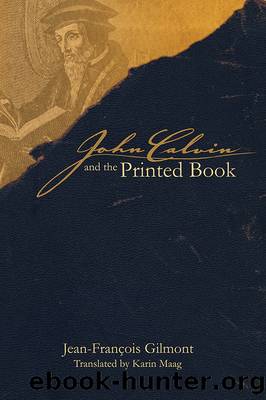John Calvin and the Printed Book by Jean-François Gilmont

Author:Jean-François Gilmont [Gilont, Jean-Francois]
Language: eng
Format: epub
Tags: HIS037090 History / Modern / 16th Century
ISBN: 9781935503484
Publisher: TrumanStateUP
Published: 2016-12-07T06:00:00+00:00
John Chrysostom
Calvin's admiration for the patriarch of Constantinople was manifest not only in his use of a relatively high number of quotations from this author. In fact, two particularly interesting pieces of evidence on this topic have survived. In the period between his exile from Geneva and the appearance of the 1541 French translation of his Institutes, Calvin planned to translate the saint's homilies into French. The most likely time frame during which he considered this project was the few months he spent in Basel between April and September 1538. The only surviving evidence of the project is Calvin's draft preface.118 The aim of the document was similar to that of the second Latin edition of-the Institutes in 1539, namely, to serve as a starting point for Bible reading. Calvin had admired John Chrysostom for many years, having cited him already in 1535.119
Calvin's preface reveals his enthusiasm for the Greek father's exegetical approach. Calvin was firm in his rejection of allegorical interpretation favored by Origen or Jerome. Instead, he praised Chrysostom's way of limiting himself to "the simple meaning of the words." Furthermore, Calvin felt that the literary genre of sermons was well suited for a wide audience. Yet we should note that Calvin's admiration was not blind. "I must admit that he too has points where he is inferior to others, points which deserve to be criticized." Calvin warned his readers against Chrysostom's doctrine of free will, which left too little room for grace, and explained that this failure was due to Chrysostom's excessive sensitivity to the reactions of the pagans.120
Alexander Ganoczy rediscovered an extremely rare edition of Chrysostom annotated by Calvin. The text in question is the 1536 Latin translation of John Chrysostom's works, published by Claude Chevallon in Paris. Most of Calvin's notes are in fact underlining; however, these marks enable us to establish which copies interested Calvin the most. This encounter with Chrysostom's works probably took place during Calvin's stay in Strasbourg. One can conclude that he read this Greek father's work in a Latin translation, and that he was struck above all by Chrysostom's rhetoric and his ability to illustrate pastoral subjects through the use of images appropriate for a broad audience.121
The parallel between the notes in this copy and Calvin's quotations of John Chrysostom in his subsequent works shows that the Reformer did not limit himself to reading Chrysostom on only one occasion or only one of his works. While only a [162] few passages quoted by Calvin in the 1539 and 1543 Institutes were in fact underlined in Chevallon's edition, Calvin's quotations of Chrysostom in his commentaries are almost impossible to find in the underlined sections of the Chevallon edition. In any case, Calvin would also have located a number of quotations from the Greek father in Grarians Decretum and Peter Lombard's Livre des sentences.
Download
This site does not store any files on its server. We only index and link to content provided by other sites. Please contact the content providers to delete copyright contents if any and email us, we'll remove relevant links or contents immediately.
Asking the Right Questions: A Guide to Critical Thinking by M. Neil Browne & Stuart M. Keeley(5757)
Autoboyography by Christina Lauren(5226)
Eat That Frog! by Brian Tracy(4524)
Dialogue by Robert McKee(4386)
Sticky Fingers by Joe Hagan(4188)
Journeys Out of the Body by Robert Monroe(3615)
Annapurna by Maurice Herzog(3464)
Full Circle by Michael Palin(3443)
Schaum's Quick Guide to Writing Great Short Stories by Margaret Lucke(3371)
Elements of Style 2017 by Richard De A'Morelli(3339)
The Art of Dramatic Writing: Its Basis in the Creative Interpretation of Human Motives by Egri Lajos(3058)
Atlas Obscura by Joshua Foer(2952)
Why I Write by George Orwell(2944)
The Diviners by Libba Bray(2927)
The Fight by Norman Mailer(2927)
In Patagonia by Bruce Chatwin(2919)
The Mental Game of Writing: How to Overcome Obstacles, Stay Creative and Productive, and Free Your Mind for Success by James Scott Bell(2897)
Venice by Jan Morris(2568)
The Elements of Style by William Strunk and E. B. White(2470)
